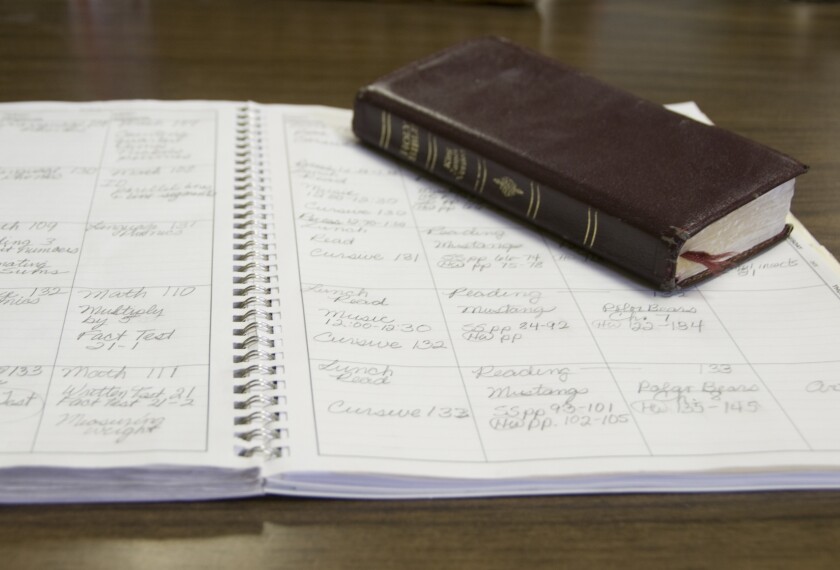Every Thursday morning, I am overwhelmed by apprehension as I head to my staff meeting. It’s not because I have to drag my worn body out of my cozy bed to get there by 7 a.m. or because I can’t play nicely with my professional learning community. The truth is: So many of us dread our morning or afternoon meetings because we KNOW that another demand for our energy, time, and effort will be on the agenda.
We also know that we seemingly have no more energy, time, or effort left to give. As the items on the agenda roll by, we wait to find out what buzzword, billionaire reformer, or babbling politician has created a new mountain of work for us. Is this a problem because we are lazy and became teachers for the summers off? I don’t think so! The teachers I know are some of the hardest working people you’ll find. It’s a predicament because we know that these demands distract us from giving our all to our students and may not be in their best interests.
It is truly impossible for teachers to meet all the requirements that districts, states, and the federal government impose in the allotted amount of time given to teach. For instance, in my state, Florida, elementary schools are required to have a 90-minute reading block, plus 30 minutes of structured PE. Add 30 minutes for lunch, 45 minutes for activity, and you’ll soon find yourself utterly dumbfounded as you try to squeeze in math, science, social studies, writing, character education, technology skills, etc., etc.
Let’s also not forget that some people will only judge our students, our schools, and our teaching abilities based on the results of whatever standardized test is given at a particular grade level. What’s tested becomes the priority in this over-scheduled environment, and other important knowledge and skills—like the history of our country or its location on the Earth—are very likely to get left behind.
So what can we do to make sure we act in the best interests of our students and include as much essential content as we possibly can? Let’s reconsider interdisciplinary lessons. Although this pedagogical method has been around for quite some time, in countless schools it has been a victim of a faulty emphasis on standardized test preparation. It doesn’t have to be that way. Policymakers may ignore our professional input, but the implementation of interdisciplinary lessons can be accomplished within our professional learning communities—where our voices can still be heard.
Getting Interdisciplinary
Carefully crafted interdisciplinary lessons can help us recover valuable instructional time. For instance, embedded in most language arts standards are numerous opportunities to address research, presentation, and technological skills standards. The same can be said for social studies and science content. At grade levels where teachers specialize, time can be saved by teachers in several content areas divvying the tasks required to meet certain standards that span their subjects. Each teacher can complete a part of the lesson in his or her class.
One of my best interdisciplinary lessons emerged when I was teaching both language arts and social studies, and I was struggling to find the time to teach my students the complete curriculum. Although this lesson won a Governor’s Award from the Florida Council on Economic Education, it is much more than an economics lesson. “The Real World” project begins with a hypothetical situation in which students have just graduated from college and now must move to another state to start their adult lives. The unit provides students the opportunity to learn about geography and the research process; explore careers; calculate loan amounts and salaries after taxes; write expository, narrative, and creative pieces; develop a budget; use technology to gather information and present a product; and more. My students loved it.
Students are enthusiastic about this project and many other interdisciplinary units with similar elements because they provide students with learning experiences that are hands-on and relevant to their lives. These experiences typically involve teamwork, problem solving, and creative and critical thinking skills. These are skills students will need in the 21st century, and they will carry what they gain through these memorable learning adventures into adulthood.
‘No Subject Is an Island’
A strong caution: Interdisciplinary lessons must be carried out with fidelity and integrity. Educators with expertise in various subjects should spend time determining where these lessons logically fit in the flow of teaching and learning. And while interdisciplinary lessons will save educators time over the long haul, they do involve extensive upfront planning. Cross-curricular connections should not be forced. They cannot and should not be used for every lesson.
For instance, I know of one school district that tried to incorporate elementary social studies into daily reading instruction with disastrous results. The allotted time for social studies became extra reading skills practice with little or no emphasis on the actual social studies standards and curriculum. A few teachers even chose to eliminate the social studies altogether. Furthermore, students who did not enjoy the reading drill came to despise social studies—a true tragedy!
It’s not the nature of knowledge to be divided up into little boxes called subjects. In reality, no subject is an island. Aspects of each can be found in others. Subjects are a curricular convenience, an organizing tool—not the exclusive turf of particular teachers or class periods—and they must not be treated that way.
By stressing connections across the curriculum, learning becomes more meaningful and engaging to our students. Additionally, interdisciplinary teaching can revitalize us by increasing instructional time, promoting more collaboration within our professional communities, and giving us the satisfaction of knowing that we are acting in the best interests of our students, while simultaneously addressing standards that otherwise might be brushed over or ignored altogether in the mad rush to get ready for the Test.




